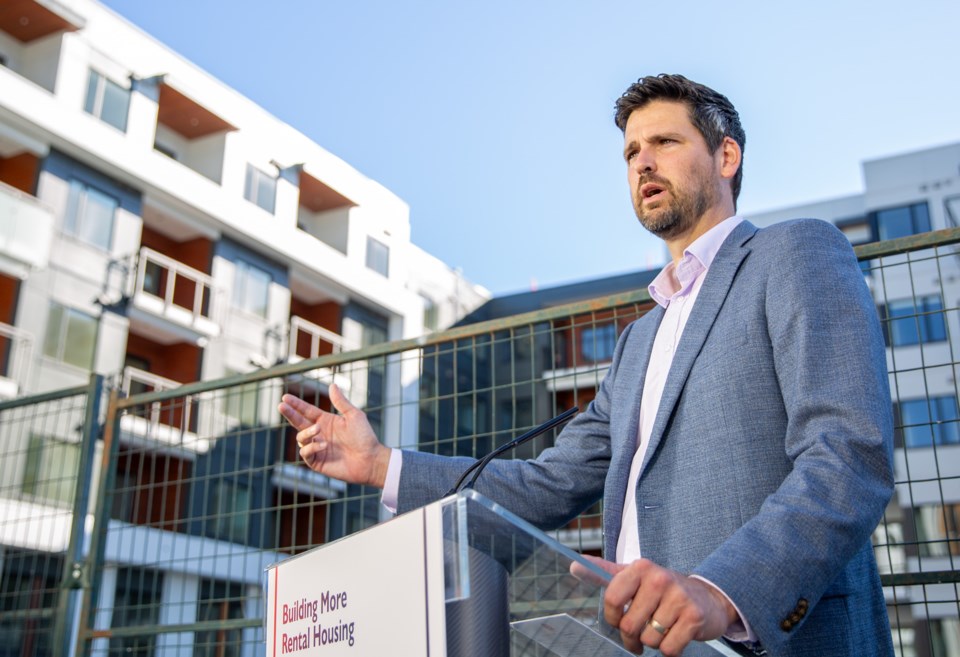Federal housing minister Sean Fraser says he will not be withholding subsidies to Metro Â鶹´«Ã½Ó³»municipalities in order to permit more housing, after the regional government voted unanimously Friday to increase construction fees to pay for growth-related infrastructure, such as sewer and water treatment facilities.
However, the Minister of Housing, Infrastructure, and Communities said he will be asking for a closer look at Metro Vancouver’s books.
Fraser’s Liberal government announced last year a $4-billion Housing Accelerator Fund, which only commenced last month.
from Surrey and Burnaby to fund an acceleration of housing permits and new affordable housing projects in response to Metro Vancouver’s development cost charges (DCC), which are now set to triple by 2027 in order to pay for an estimated $11.5 billion of growth-related park, water and sewer infrastructure over the next three decades.
Fraser said he will be “re-examining the proposed initiatives in each city’s application, and will make necessary adjustments where the initiatives conflict with the position taken at today’s Metro Van Board meeting.”
Fraser’s government had just axed the GST from market rental construction and increased the cap on mortgage bonds in order to spur financing on construction amid concerns rising interest rates coupled with inflated land prices is sinking developments.
In a letter sent to the board ahead of Friday's vote, Fraser had asked Metro Â鶹´«Ã½Ó³»to waive the fees for market rentals but the regional government is only doing so for non-market housing.
“I intend to discuss the role the provincial government may play in permitting Metro Â鶹´«Ã½Ó³»to waive DCCs on new apartment buildings that will offer homes on the rental market,” wrote Fraser in a statement to Glacier Media.
Fraser also wants a closer look at the books: “I will also be seeking their confirmation that the proposed DCCs are being used to fund infrastructure needs related to growth, rather than to address existing fiscal challenges,” he said.
Based on Metro Vancouver’s reports on the matter Fraser will find a regional government desperate for funding to pay for expanded infrastructure needed for the very housing Fraser is wanting. Many Metro Â鶹´«Ã½Ó³»directors have noted that that new federal environmental requirements have pushed up the costs of the likes of new sewer treatment plants.
Fraser may also discover and the fee for sewers and drainage has not increased since that one was introduced in 1996.
The Metro Â鶹´«Ã½Ó³»board has adopted the mantra that “growth should pay for growth” despite objections from developers who insist the fees will eat into profits, burdening their financing.
Fees will vary slightly within the region; however, one townhouse unit in Vancouver, for example, will be charged $30,861 by 2027, up from $10,027 today.
The board considered delaying the fees by one year but that motion was rejected by a majority of weighted votes among the 40 directors Friday.
Port Coquitlam Mayor Brad West led the most vocal charge against any changes to Metro Â鶹´«Ã½Ó³»staff recommendations to proceed.
West called Fraser’s letter a political manoeuvre, “akin to a hostage taking.”
West said Port Coquitlam has low municipal DCCs but housing prices are not any lower there than anywhere else in the region — an indication the market will set the price.
“Industry didn’t hesitate to sell for what the market could do,” said West.
“I don’t believe for one minute that delaying or scrapping this DCC will result in one iota of affordable housing being built,” said West.
Â鶹´«Ã½Ó³»city councillor Sarah Kirby-Yung offered a different take on the situation in supporting Â鶹´«Ã½Ó³»city councillor Lisa Dominato’s proposed delay.
"We have a lot of projects being paused or shelved in the City of Â鶹´«Ã½Ó³»due to the economic conditions,” said Kirby-Yung, asserting the delay would “buy us some good will” with the federal government.
Metro Â鶹´«Ã½Ó³»doesn’t just need new money for new projects, it also needs more money for existing upgrades. And for that it will be raising property taxes: the Metro Â鶹´«Ã½Ó³»portion of an average household will rise from $623 this year to $854 by 2027 (lower than prior projections of $1,023). These new rates will pay for a $22.9-billion bill for upgrades by 2050.
Metro needs to build 90 kilometres of new water transmission mains, two new in-system reservoirs, two new pump stations and a new source water intake treatment facility. Ten new sewer facility projects are earmarked as well, according to the Oct. 5 staff report.
A presentation from Sonu Kailley, acting director of financial planning, shows the region needs to raise $11.5 billion for growth-related capital projects. Two years prior the bill was $8.1 billion. The report does not provide detailed breakdowns nor explain the $3.4-billion difference.




